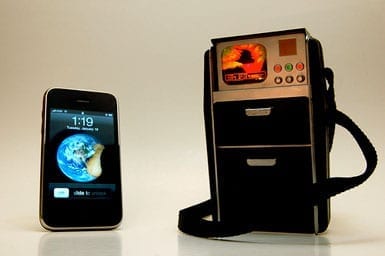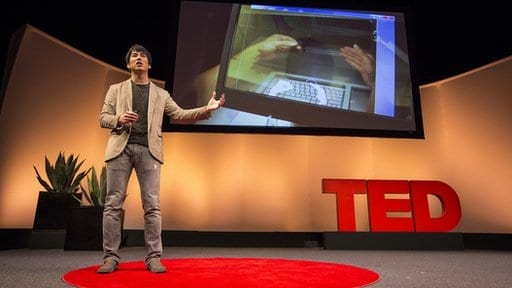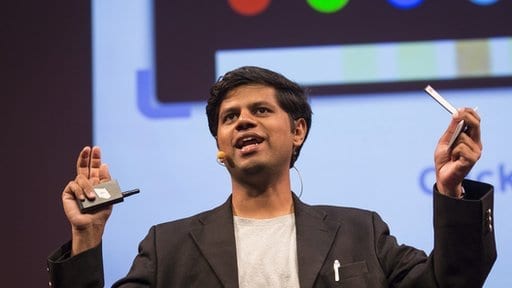
Boy wonder Jack Andraka is creating a dream team of young scientists to work on creating a Star Trek–like handheld device that can diagnose disease just by scanning your skin.
The $10 million Tricorder X Prize asks entrants to create a handheld mobile platform that can diagnose 15 diseases across 30 patients in just three days. A NASA Ames-based startup called Scanadu is working on a model that will cost under $150. But Scanadu is about to have some competition: a three-person team of Intel Science Fair finalists, led by Jack Andraka, the 2012 winner. The group of kid geniuses–they’re calling themselves Generation Z–is working on a smartphone-size device that can, according to Andraka, “diagnose any disease instantly.”
In 2012, Co.Exist spoke to Andraka, a 15-year-old (he’s now 16) who won the Intel International Science and Engineering Fair for developing a nearly 100 percent accurate paper sensor that detects pancreatic cancer better than anything else out there–it’s over 400 times more sensitive, 168 times faster, and 26,000 times less expensive than today’s methods. We were the first news outlet to speak to Andraka; since our interview, he has become something of a media sensation. And on Wednesday, he hit TED’s stageto talk about his accomplishments.
Generation Z started coming together last year when the team members met at the 2012 science fair. The group started working in earnest this summer and will continue plugging away at least until the X Prize deadline in 2015–Andraka’s senior year of high school.
The team members are all working on different pieces of the tricorder. Andraka says that he is working on “something the size of a sugar cube that can look through your skin and into your bloodstream, look at every single protein in your blood, and diagnose diseases based on that.” Another team member is working on a flash drive-size ultrasound machine. Yet another is working on an MRI test that fits on a card.
There are no Ph.D.-clad scientists helping with the project. “It’s all just us, the kids. It’s fun knowing no one’s helping,” says Andraka. The group doesn’t have funding, either, but the majority of the members have access to labs. Andraka is hoping that the sensors used in the group’s device will cost under $50, but right now, he says, “We haven’t really dealt with that. We’re just developing the technologies.”
The Latest Bing News on:
Handheld disease diagnostics machine
- Machine learning tool identifies rare, undiagnosed immune disorders through patients' electronic health recordson May 1, 2024 at 1:16 pm
Researchers say a machine learning tool can identify many patients with rare, undiagnosed diseases years earlier than current methods, potentially improving outcomes and reducing cost and morbidity.
- Medical Sensors Market worth $3.6 billion by 2029 - Exclusive Report by MarketsandMarkets™on May 1, 2024 at 7:02 am
The medical sensors market is valued at USD 2.4 billion in 2024 and is projected to reach USD 3.6 billion by 2029; it is expected to grow at a CAGR of 8.1% from 2024 to 2029 according to a new report ...
- AI Is Moving Biology From Science To Engineering, Advancing Medicineon April 30, 2024 at 6:00 am
Jensen Huang: "For the very first time in human history, biology has the opportunity to be engineering, not science." ...
- Machine learning system offers new hope for diagnosis of rare genetic disorderson April 25, 2024 at 11:30 am
The team developed a machine learning ... clinical diagnostic laboratory noted that AIM's module can contribute to predictions independent of clinical knowledge of the gene of interest, helping to ...
- Exo adds FDA-cleared AI tools to handheld ultrasound systemon April 25, 2024 at 8:50 am
Exo sees the new capabilities as especially helpful for healthcare providers in rural and under-resourced settings.
- Ultrasound Devices Market is Set to Surpass Valuation of USD 11,229.9 Million By 2032: Astute Analyticaon April 23, 2024 at 5:30 am
The global ultrasound devices market surges, driven by rising chronic diseases, technological advancements in portability and imaging, and an aging population demanding accessible diagnostics. Growth ...
- Sniffing Out Disease With “Scentprints”on April 23, 2024 at 1:58 am
In this interview, Technology Networks spoke to Karim Aly, CEO of Noze to find out more about replicating human odor perception and the benefits of breath-based disease detection.
- Women's heart disease is underdiagnosed, but new machine learning models can help solve this problemon April 22, 2024 at 9:00 pm
When it comes to matters of the heart, cardiovascular disease in women is underdiagnosed compared to men. A popular scoring system used to estimate how likely a person is to develop a cardiovascular ...
- Duke mechanical engineers develop more efficient diagnostic platform for cancer, other diseaseson April 22, 2024 at 4:48 pm
A team of mechanical engineers has created a new diagnostic platform that can be used to detect various cancers and other serious medical conditions with greater efficiency.
- The suitcase-sized kit helping to rid the Philippines of one of history’s great killerson April 2, 2024 at 5:52 am
Tuberculosis has plagued the world for thousands of years and remains a leading cause of death ...
The Latest Google Headlines on:
Handheld disease diagnostics machine
[google_news title=”” keyword=”handheld disease diagnostics machine” num_posts=”10″ blurb_length=”0″ show_thumb=”left”] [/vc_column_text]The Latest Bing News on:
Jack Andraka
- Feed has no items.
The Latest Google Headlines on:
Jack Andraka
[google_news title=”” keyword=”Jack Andraka” num_posts=”10″ blurb_length=”0″ show_thumb=”left”]










